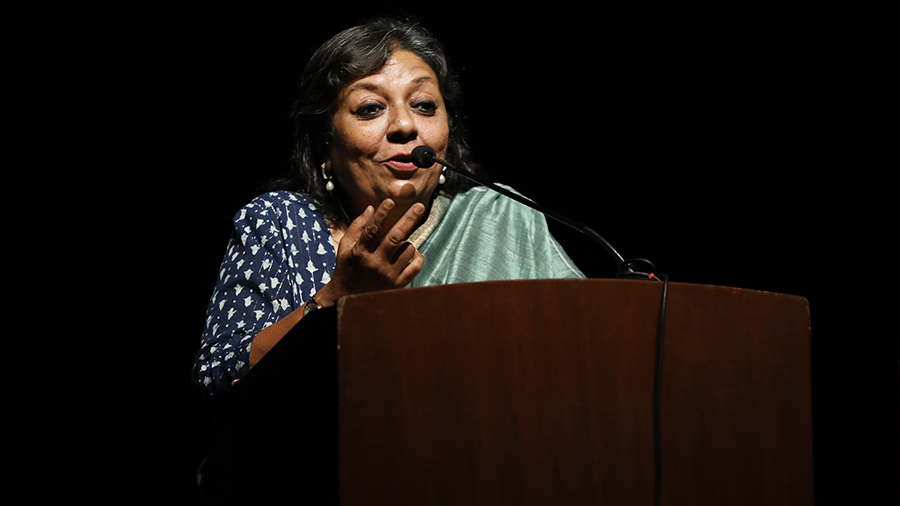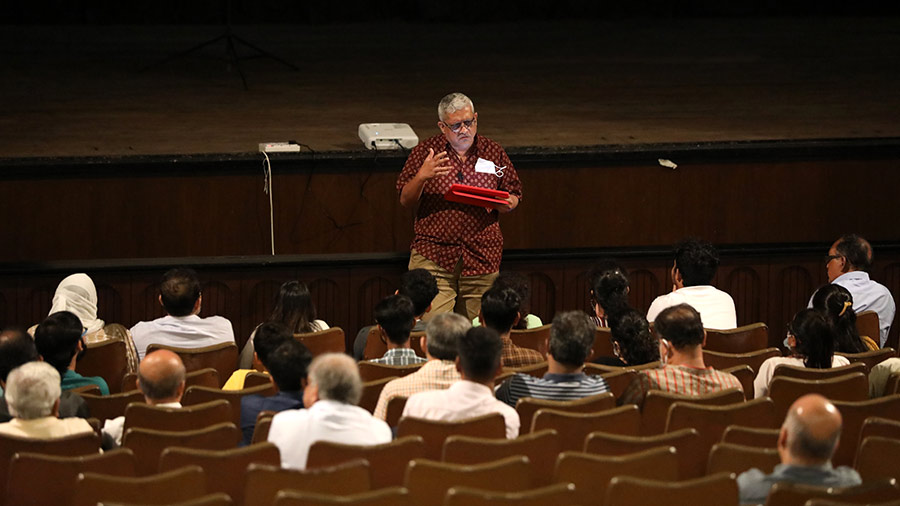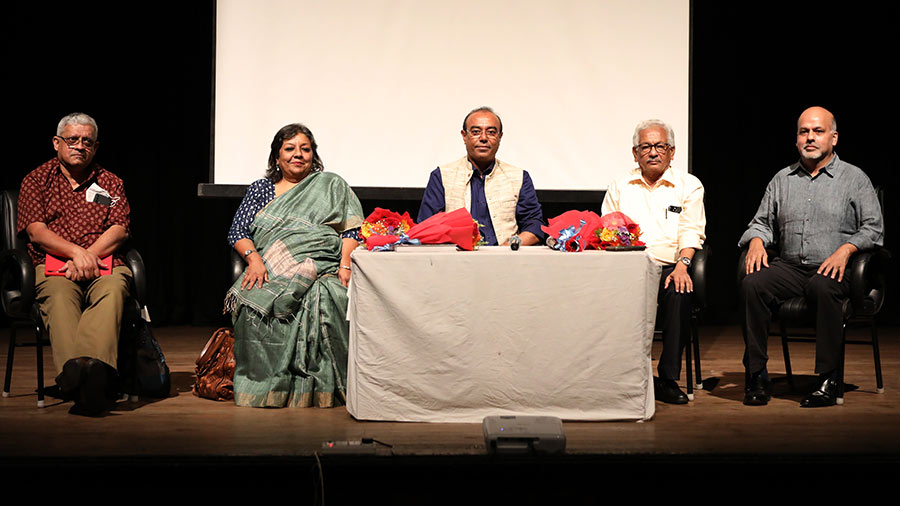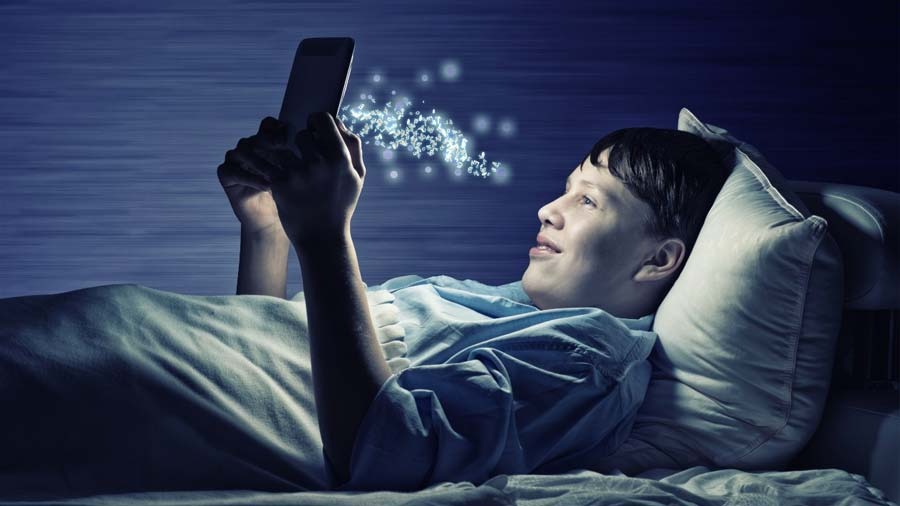How much screen time is too much?
Can it be addictive?
Why do we spend so much time on the screen?
How does it affect young people?
What can we do about it?
These were some of the questions discussed at a public awareness programme titled ‘Screen Addiction – A Myth or A Reality’, organised by the Kolkata Psychiatry Club, in collaboration with My Kolkata (The Telegraph Online) on August 15 at Kala Mandir.
The Covid-19 pandemic ushered in a new normal where young people were confined to the screen as schools went online aggravating an addiction that has anyway been on the rise. But is it really an addiction? And how harmful can it really be?
Two experts – Vivek Benegal, professor of addiction medicine, NIMHANS, Bangalore, and a pioneer in the field of behavioural addiction, and Sharmila Bose, director, Sushila Birla Girls’ School, Kolkata – spoke about the ins and outs of screen addiction, adding valuable insights for parents, teachers and mental health practitioners on how to address the overuse of smartphones among young people. The speakers were introduced by KPC secretary Sabyasachi Mitra.
Two hours is the magic number when it comes to screen time
“Two hours seems to be the magic number when it comes to screen time according to guidelines set out by the American Association Paediatrics and later adopted by both the Indian Association of Paediatrics and the Indian Psychiatric Society,” said Benegal, addressing the issue of how much is too much. According to studies, screen usage of over two hours a day leads to poorer educational outcomes and poorer sleep and fitness.

Sharmila Bose, director, Sushila Birla Girls’ School
Bose, who has been an educationist for 40 years, said that students have confessed to spending an average of seven hours on devices. “With school going back offline, children are spending six-and-a-half hours in school. Outside school they spend seven hours on their devices. Which means that every waking moment is spent on their devices,” said Bose.
“Spending more time playing games rather than going out and playing with other children reduces socialisation. The ability to socialise with another person is very important… it helps you to empathise,” said Benegal.
Designate media-free hours and media-free locations at home
There are global norms and guidelines for what should be the ideal exposure to screens among children that Benegal pointed out – below 18 months, avoid any use of screens other than video chatting; 18 to 24 months, no use of screens other than infrequent, high quality programming but it is important for parents to watch with the children and help them understand the context; two to five years, limit is one hour a day of high quality programming co-viewed with parents; six and older, place strict limits on media time and types and make sure it is not taking over sleep or other healthy behaviours; for teens, more than limiting screen time it is important to encourage non-screen activities like spending time with their friends, exercise and proper sleep. He also pointed out the importance of designating media-free hours like meal times and media-free locations at home like bedrooms, keeping the computer in a common area, and stressed the need for parents to research, be aware and clued into what the children are watching.
Your child has many friends, only one set of parents; please do your job description
Both Benegal, Bose and the moderator for the programme, Jai Ranjan Ram, a leading psychiatrist and co-founder of Mental Health Foundation (Kolkata), underlined the parenting myth of “I am my child’s friend” that is at the root of many of the problems. “My response to ‘I am my son’s/daughter’s greatest friend’ is, ‘Your child has many friends, only one set of parents. Please do your job description’,” said Benegal. “I don’t understand when mental health practitioners say that try and interact with your child as friends. Parents cannot be friends,” added Ram.
Bose agrees that parents are no longer authority figures. “They are trying very hard to be friends. Then how are you going to bring your child in line and say not more than three hours of screen time? Children make all the decisions in the house,” said Bose.
35 percent of the young people… qualified for addictive internet use
The conversation then turned to the concept of behavioural addiction, something that came up in the 1990s, that one can get addicted to gambling, shopping, exercise, sex and gadgets like the mobile phones, just like one can get addicted to substances like alcohol, nicotine and other drugs.
“Over the last five years, there has been a five to 10 percent increase in the number of young people we get to see with problems of screen addiction,” said Benegal who shared data from a colleague’s study that in India gaming addiction has gone up five percent in the last few years. And 35 percent of the young people, between the ages of 15 and 35, that my colleague interviewed halfway through the pandemic qualified for addictive internet use,” said Benegal. And most of these young people tended to play more when they were sad or angry or bored and it is the same thing that is seen for substance addiction where one uses it to self-medicate and end up in trouble.

Vivek Benegal, professor of addiction medicine, NIMHANS, Bangalore
Being on social media can give a much bigger sense of reward than any substance
Addiction, according to Benegal, is more about losing control than about excessive use, which is why one can get addicted to anything. Losing control means one tends to use it again and again, and it becomes the most important thing in their life. Regular and persistent use, especially in younger people, makes structural and functional changes in their brain that are long lasting. And the earlier one starts, the greater the chances for developing an addiction. Benegal then segued into the reward circuit of the brain that causes us to repeat things that are required in our life like food, shelter and sex. “But unnatural things like substances give us a much bigger sense of reward than the natural ones. People who have a reward deficit state are more likely to repeat the activities and your brain hardcodes that,” said Benegal, who pointed out that being on social media can give a much bigger sense of reward than any substance.
Some of the most creative children are more prone to addiction
Benegal also spoke about how there are some kids at higher risk. These are children who have difficulty with cognitive control, they move from one thing to the other; children who are impulsive, they can’t sit in one place, blurt out answers even before others; children who have higher emotional reactivity, difficulty in controlling their moods; and children who have higher rejection sensitivity, who are much more sensitive to real or imagined rejection. “These are some of the most creative children but also those who are more prone to addiction and mental health problems,” said Benegal.
Socialising, meeting friends and engaging in activities that require physical interaction
The talk then moved to concrete steps that can be taken to address the rising addiction to screens. Benegal spoke about prevention and the importance of providing alternatives. Socialising, meeting friends and engaging in activities that require physical interaction is one of the key alternatives according to Benegal. Regulation at the family level where the family sits together and draws up rules about screen usage and decides rewards and loss of rewards about adhering to them is another thing that can be done.
The actual control rests with the parents
“The other key thing is parenting. We talk about age-appropriate parenting where you are involved much more when your child is three years old than you will be at the age of 16, but you will still be involved by being aware. There are no prizes for not being aware, in fact there are consequences for not being aware. Don’t be afraid to say this is how it will be,” said Benegal, who also talked about communication and time-outs as other key aspects of parenting.
The onus for preventing over exposure to screens really lies with the parents, agrees Bose. “Schools and teachers can do very little to prevent screen addiction. All schools have very strict rules about mobile phone usage within the premises. So the ball, in this case, is very much in the court of the parents. What schools can do is give advice or raise awareness about issues of cyber security and how AI is manipulative but the actual control rests with the parents,” said Bose.
But she was quick to point out that we need to be aware that for the children, the virtual is almost as real as the real world and in this mass of screen-addicted children is the next scientist, the next philosopher.
“We need a lot more awareness among parents to bring more synergy into what their children are doing and we need to be far more knowledgeable about what is happening to appreciate it because we can’t say that it is all bad,” added Ram.
The discussion on screen addiction was the fifth public awareness programme organised by KPC, which was formed 11 years ago. “We started with 27 members, psychiatrists and clinical psychologists. Today we have 70 members and we are not just about seminars and webinars but also social gatherings and awareness programmes about things that disturb us,” said Prabir Paul, the president of KPC.

